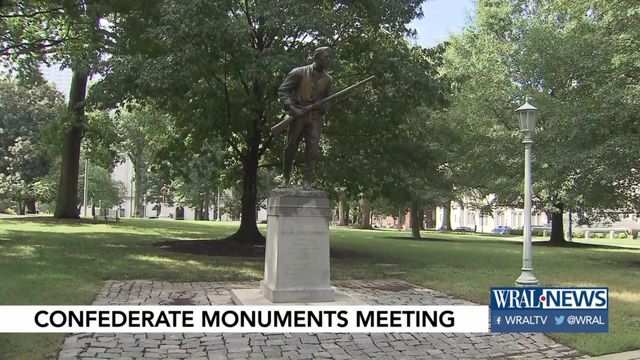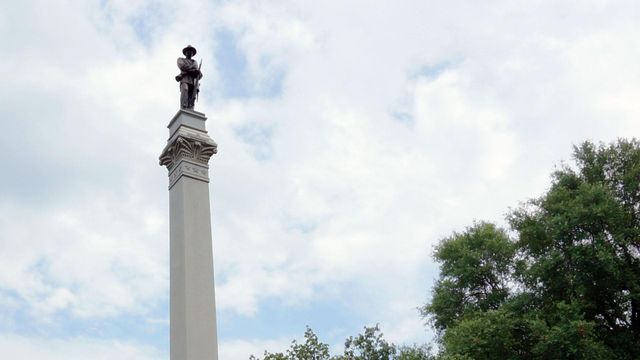Historical Commission votes to keep, add context to Confederate memorials
The State Historical Commission voted Wednesday not to move three Confederate monuments on state Capitol grounds in Raleigh, adopting a recommendation from its task force that a 2015 state law prohibits them from relocating the statues.
Posted — UpdatedThe commission instead voted to add signage providing more context about the statues, as well as adding memorials to African-Americans and other underrepresented groups. Among that context: that slavery caused the Civil War and information about the oppression black people continued to suffer following the war.
In 2015, state lawmakers voted to make it illegal to move any historical monument unless it's for reasons of historical preservation or public safety. The commission's monument study committee Wednesday morning said that law seems to limit their ability to remove the three Confederate statues.
"Even if relocation were necessary to preserve the monument, we are not certain we could do so under the constraint of the so-called comparable area of honor or prominence," commission Chair David Ruffin said during the study committee meeting. "It’s hard at some level to envision an area of prominence that would equate to our Capitol square in this state."
Two members of the five-person committee, Noah Reynolds and Valerie Johnson, the lone black member, disagreed and voted against that part of the measure.
Republican leadership indicated a willingness to do so. Cooper told reporters Wednesday afternoon that he'll be glad to hear from them on the issue. He noted that his recent budget proposal included funding for an African-American monument, but the General Assembly cut it from the final budget.
Cooper also called, again, for the law protecting the monuments from being moved to change, something GOP leaders have dubbed a non-starter. The governor said this will be one of many issues before voters this November when they elect a new General Assembly.
"This General Assembly is turning its back on what the right thing to do is," he said.
State Capitol Police converged on one person who protested the monument committee's recommendation, rising to read a speech from her cell phone as the group adjourned. The officers took her out of the room. handcuffed her and drove her away in a police cruiser in a matter of minutes. A spokesperson with the North Carolina Department of Public Safety identified her later as 35-year-old Ashley Popio of Raleigh. Popio was cited with causing a public disturbance and obstructing an officer, both misdemeanors. She has since been released.
State Senate Leader Phil Berger, R-Rockingham, lauded the commission for following the law "and listening to the overwhelming majority of public comments" that wanted the monuments to remain. In a statement, he said he agreed with the commission that "there's more of the story that should be told" and said the men and women enslaved in the state deserve their own monument.
"I support the committee’s recommendations and pledge to work with my colleagues to implement them," Berger said in a statement. "The thoughtful and deliberative process stands in stark contrast to the mob rule from earlier this week. When people with different perspectives come together in good faith, we can solve problems."
Berger's House counterpart, Speaker Tim Moore, also praised the commission for its civil discourse and indicated his continued backing of the law prohibiting the removal of statues.
"I support implementing the commission’s recommendations so that North Carolina's historical statues can continue to serve as visual reminders of the social progress our state has achieved," Moore said in a statement.
Gabrielle Middlebrooks, one of a few protesters outside the meeting, questioned whether the monument study committee was well suited to decide how to handle the memorials. It was made up of one black woman and four white men, including a descendant of Edmund Ruffin, the man widely believed to have fired the first shot of the Civil War.
Frank Powell, with the Sons of Confederate Veterans, said Wednesday's outcome was probably the best one his group could hope for, but he still had concerns. He said the language the commission adopted asserting slavery as the cause of the Civil War oversimplifies the issue. He said he's wary of what additional context might be added to the memorials on Capitol grounds, but said he can't judge until he sees specific language.
The state Department of Natural and Cultural Resources will develop that language, subject to the approval of the commission. Department spokeswoman Michelle Walker said there's no timetable yet for that process.
Also on the State Historical Commission's agenda Wednesday was a request to relocate Silent Sam. Although the statue itself was ripped from its plinth by protesters Monday night and later removed from the scene by campus officials, its base remains.
But commission members unanimously decided not to consider the request because it came from private individuals, not the university, and lacked legal standing.
Cooper was also asked Wednesday about efforts to keep the Capitol Square monuments from being damaged and said the state would do what it can "to keep our capitol grounds and public places safe and secure."
"It's important for people to be able to express themselves," the governor said. "Freedom of speech is critical, but public safety is paramount."
'An assertion of white supremacy'
North Carolina State University professor Dr. Susanna Lee takes her students on a tour of the monuments as part of her course.
The Capitol Confederate monument from 1895, with the seal of the Confederate States of America, the Henry Lawson Wyatt statue, a 1912 tribute to the first North Carolina Confederate soldier killed in the Civil War, and the 1914 Women of the Confederacy monument are on her list.
But Lee thinks the monuments should be moved elsewhere because, she says, they aren't about veterans.
"The monuments placed in Confederate cemeteries in the late 1860s and early 1870s, those are about mourning the Confederate dead. These monuments are an assertion of white supremacy," she said.
The three statues were erected during the period of racial violence at the turn of the 20th century in North Carolina, including the white supremacy campaign and the Wilmington Riots of 1898.
"So, these monuments are a great deal more problematic, I think, in our present context because they're outside of these sites of governmental power," Lee said.
Some of Lee's students believe the Civil War was a noble fight about states' rights, not slavery. Lee says that was a rewriting of history by Southern leaders after their loss to Union forces.
"Growing up in the South, we've inherited these ideas. And so people have learned them and to suddenly learn and to see evidence to the contrary can be destabilizing," she said. "I think people feel as though they've been insulted. Well, it's not about taking offense or being defensive or feeling guilty. It's about understanding the past and what really happened."
Related Topics
• Credits
Copyright 2024 by Capitol Broadcasting Company. All rights reserved. This material may not be published, broadcast, rewritten or redistributed.






